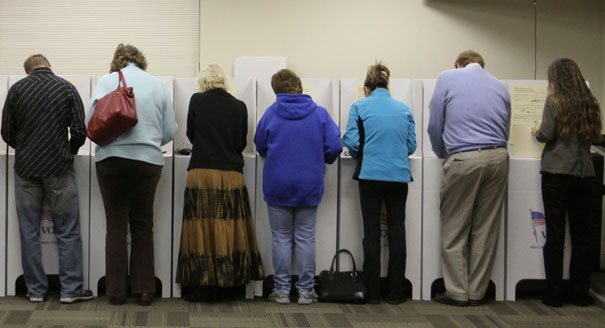Gallup: Congressional Candidates Face Split Electorate

Despite the narrative that the Republican presidential field faces trouble from disgruntled voters in an election year, the bloody political campaign doesn’t seem to have negatively affected congressional Republicans who are also being gauged by constituents.
A recent Gallup poll indicates that congressional Republicans have climbed back into a competitive status with their Democratic colleagues for a November showdown. That’s reflected in the current sentiment of the nation’s registered voters and it’s a contrast from where the congressional Republicans were with voters just a few months ago.
As it turns out, U.S. registered voters are now currently split on whether they’ll be voting for a Republican or a Democrat in their congressional districts this fall. The latest figures show that 47% of polled voters say that they would vote for either the Republican or Democratic Party’s candidate if the election was today. Only 6% of voters are undecided on the matter.
Gallup asked the following question to a randomly sample of 1,014 adults, aged 18 and older living in the United States and the District of Columbia: “If the elections for Congress were being held today, which party’s candidate would you vote for in your congressional district--[ROTATE] the Democratic Party’s candidate or the Republican Party’s candidate?”
In August- a time when the same question was posed to a sample of the nation's voters- Democrats held a larger advantage with those who said that they would vote for a candidate from the party. Within that period, a majority 51% said they would vote for the Democratic Party’s candidate while 44% said they would vote for the Republican Party candidate. By December-the last time Gallup conducted the survey- the advantage held by Democrats shrunk with only 49% of voters siding with them while 45% sided with Republicans.
Since last summer, it appears that the GOP has gained at least some momentum. The bigger picture, however, is the significance for the nation’s Independent voters.
With Gallup’s congressional ballot measure being tied, the organization’s analysis takes a hold of notion that these latest numbers “underscore the divided nature of the political landscape in America.”
In other words, the numbers are another manifestation a divided electorate. By some accounts, polarization is intensifying now more than ever and it’s a concern constantly highlighted by Independent voters.
Ultimately, however, current gridlock is not a circumstance over which Independents need to distress- especially at this crucial time. As the last few polls on the subject of congressional support have demonstrated, one political party may not enjoy the preference of the electorate for long. It can change in a matter of months.
In all plausibility, these very shifts in supporting one party or another in the polls could be due in part to the growing influence of Independents. They’re the ones becoming an integral part of the political process. After all, it’s their numbers continue to expand while the growth of two main political parties pale by comparison.
Unlike previous times, by virtue of their exploding growth, Independents matter now more than ever in a polarized environment.
With momentum in favor of electing congressional Republicans in this latest Gallup poll, the political landscape may be changing in their advantage for now. In the time of an ailing economy- one which Gallup measures at 9.1% unemployment and at 19% underemployment- it’s not an advantage that will hold stable unless there’s a solid message to keep Independents on their side.
This latest Gallup poll is based on telephone interviews conducted February 16-19, 2012. It had a 95% rate of confidence and maximum margin of error of +/- 4 percentage points.




